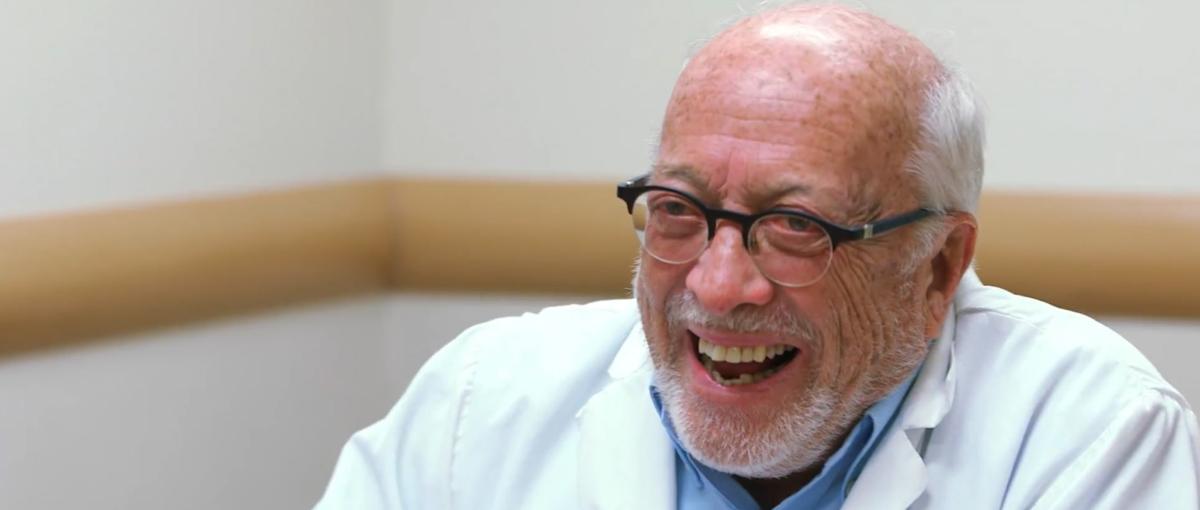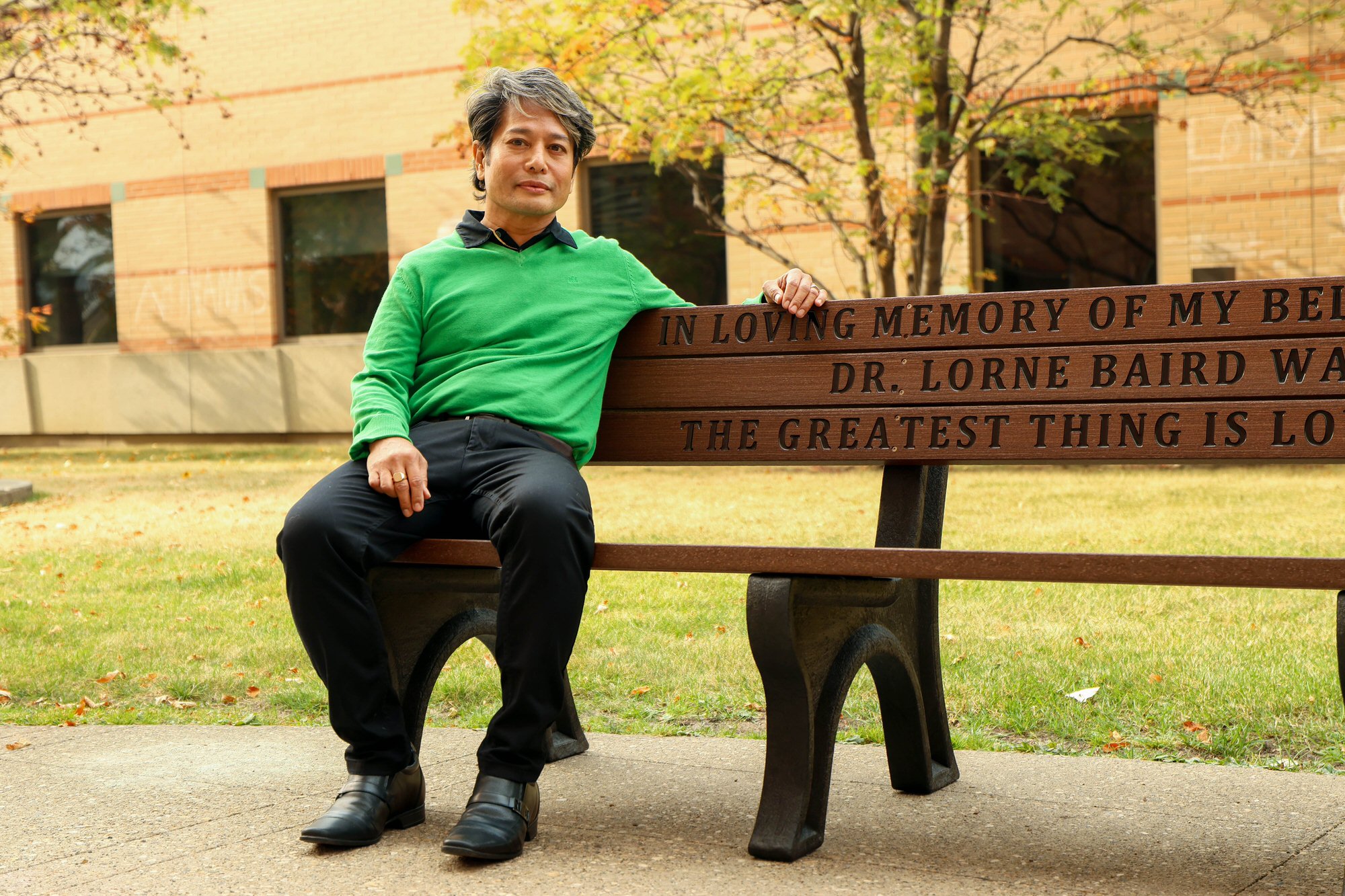Honouring a half-century career of LGBTQ2S+ advocacy
Bench donation memorializes the contributions of Dr. Lorne Warneke to the Grey Nuns hospital

December 7, 2022
By Daniella Tintinaglia, Digital Communications Advisor, Covenant Health
After Dr. Lorne Warneke, the site leader for psychiatry who established a gender clinic at the Grey Nuns Community Hospital, passed away in 2020, his husband, John Chan, wanted to do something to memorialize him at the hospital.
“I figured that Lorne would want some type of memorial that helped patients, that they could use and enjoy,” says John. “So I came up with the idea of placing a bench outside the clinic so patients can enjoy the fresh air while appreciating his contributions.”
John made his memorial gift of the bench installation through a donation to the Covenant Foundation. The bench was dedicated on October 5, 2022, in a ceremony commemorating Lorne’s work at the hospital.
Lorne opened the gender clinic in 1996, welcoming transgender patients and their families to have productive discussions about gender identity and acceptance. At the time, AIDS was the leading killer of Americans aged 25-44, drug treatments were proving ineffective and infection rates were climbing rapidly. Homophobia and transgender stigma were apparent as people pointed the finger of blame at the LGBTQ2S+ community. Many medical professionals shut their doors to helping this community, but not Lorne. In addition to treating obsessive-compulsive and anxiety disorders — his specialty — for many years, he was the only psychiatrist in Alberta who treated transgender patients.
“Lorne was a kind-hearted, gentle man and a very well-respected psychiatrist here in the city, serving as site leader in psychiatry for close to 20 years,” says Dr. Padraic Carr, current psychiatrist, past president of the Alberta Medical Association and a former colleague of Lorne’s. “His nature was to advocate strongly for the patient, regardless of patient diagnosis. As a person, he was incredibly kind and warm. He welcomed me from the start and had a way of making the staff feel at ease. As a hobbyist photographer, he would print, frame and hang his nature photography, at his own expense, to line the halls of the hospital to make everyone feel at home.”

A sample of Lorne’s photography that lines the wall of the psychiatric department at Grey Nuns Community Hospital.
Lorne’s contributions to the LGBTQ2S+ community didn’t begin with the Grey Nuns gender clinic. In 1984, he convinced Alberta Health to pay for gender reassignment surgery. And in 1995, he served as a physician expert in the case of Vriend vs. Alberta, which involved a college teacher getting fired for being gay. The case was brought before the Supreme Court of Canada and resulted in a ruling to include sexual orientation as a protected area in Alberta’s human rights legislation.
“I‘ve never met someone who wrote more letters to the editor or advocated for his patient population than Lorne,” says Gordon Self, chief mission and ethics officer at Covenant Health. “He was a very kind man, but tenacious. He wouldn’t be dissuaded by discrimination but instead would raise questions, challenging others’ biases and misunderstanding, including my own, while courageously advocating for this vulnerable patient population.”
In addition to facing the stigma brought on by the AIDS crisis, opening the gender clinic in the mid-90s in a Catholic healthcare organization was no easy feat for Lorne. He was convinced, however, that change needed to happen from within.
“There were a lot of misunderstandings about his work with the LGBTQ2S+ population and what was possible with Catholic healthcare ministries,” says Gordon. “He suffered stigma, ridicule and, at times, hostility. Still, Dr. Warneke continued to challenge patiently, while always being thoughtful, respectful and compelling. He held us accountable to our mission of helping the marginalized and leaving no one out. His work was the embodiment of our values: standing up against the status quo and offering compassionate care to all walks of life.”
After a half-century career devoted to his patients, Lorne retired in 2017, making a decision that wasn’t easy for him.
“Lorne was the type of person who lived for his work,” says John. “When he retired, he really struggled leaving behind all the people who still needed his help.”

Lorne's husband, John Chan, sits on the bench he donated to the Grey Nuns Community Hospital in memory of Lorne. The bench reads: In loving memory of my beloved, Dr. Lorne Baird Warneke. The greatest thing is love.
Sadly, Lorne passed away not long after retiring due to injuries sustained from a fall. Though he continues to be missed by many, John is confident that his memory will carry on for years to come.
“Everyone loved Lorne. Former patients always say that without Lorne they wouldn’t be here today,” says John. “I know I feel the same way.”
Lorne’s memorial bench is located at the Grey Nuns hospital on a patio outside the mental health wing, an area frequented regularly by patients and staff.